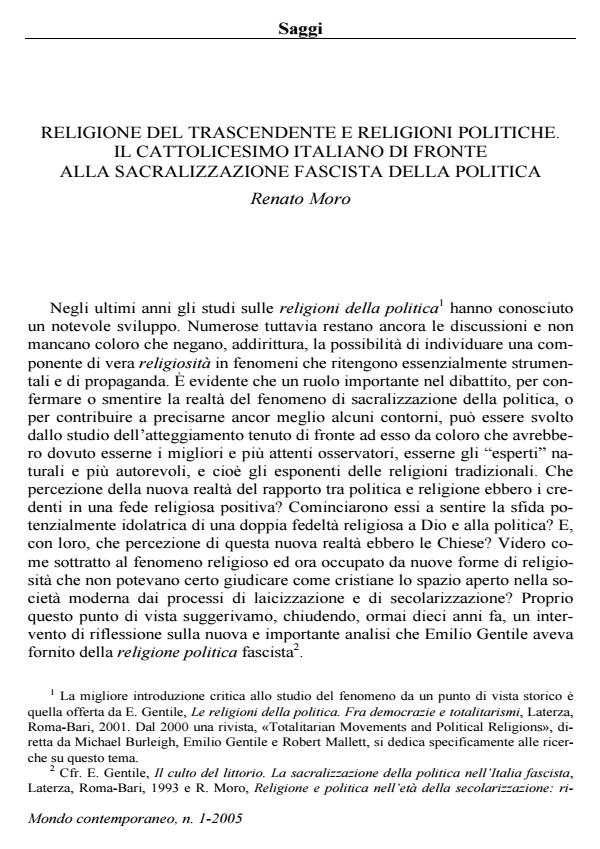Religione del trascendente e religioni politiche. Il cattolicesimo italiano di fronte alla sacralizzazione fascista della politica
Titolo Rivista MONDO CONTEMPORANEO
Autori/Curatori Renato Moro
Anno di pubblicazione 2005 Fascicolo 2005/1
Lingua Italiano Numero pagine 59 P. Dimensione file 244 KB
DOI
Il DOI è il codice a barre della proprietà intellettuale: per saperne di più
clicca qui
Qui sotto puoi vedere in anteprima la prima pagina di questo articolo.
Se questo articolo ti interessa, lo puoi acquistare (e scaricare in formato pdf) seguendo le facili indicazioni per acquistare il download credit. Acquista Download Credits per scaricare questo Articolo in formato PDF

FrancoAngeli è membro della Publishers International Linking Association, Inc (PILA), associazione indipendente e non profit per facilitare (attraverso i servizi tecnologici implementati da CrossRef.org) l’accesso degli studiosi ai contenuti digitali nelle pubblicazioni professionali e scientifiche.
Fascism proclaimed to be a religious movement and many scholars today look at it as one of the totalitarian political religions of the 20th century. Did Italian Catholics perceive this aspect of the regime and did they feel Fascism as a religious danger? The essay examines a wide range of sources (newspapers, journals, books) and tries to specify the main different trends and phases in Catholic attitude: the dispute of the ’20s against the pagan State, the discussion, after the Conciliazione of 1929, on the religious nature of the Fascist totalitarian State, the persuasion that Nazism and Communism were both part of a common neo-pagan phenomenon, both forms of a new modern idolatry. For a long time, however, the idea of neo-paganism led to distinguish Italian Fascism from other political religions: Catholic analysts asserted that the difference between Fascism and Nazism lay exactly in the fact that Fascism, unlike Nazism, was not an antichristian religion. Nevertheless, at the end of the ’30s, with the growing friendship between Fascist Italy and Nazi Germany and the introduction of racism, eminent members of the clergy begun to consider pagan idolatry the most dangerous enemy for the Church, including Fascism in their condemnation. At the same time, Catholic interpretations viewed the religious dimension of Fascism more as a possible future menace (dangerously alive in some currents of the Pnf) than as the real nature of the Mussolini’s regime.
Renato Moro, Religione del trascendente e religioni politiche. Il cattolicesimo italiano di fronte alla sacralizzazione fascista della politica in "MONDO CONTEMPORANEO" 1/2005, pp , DOI: